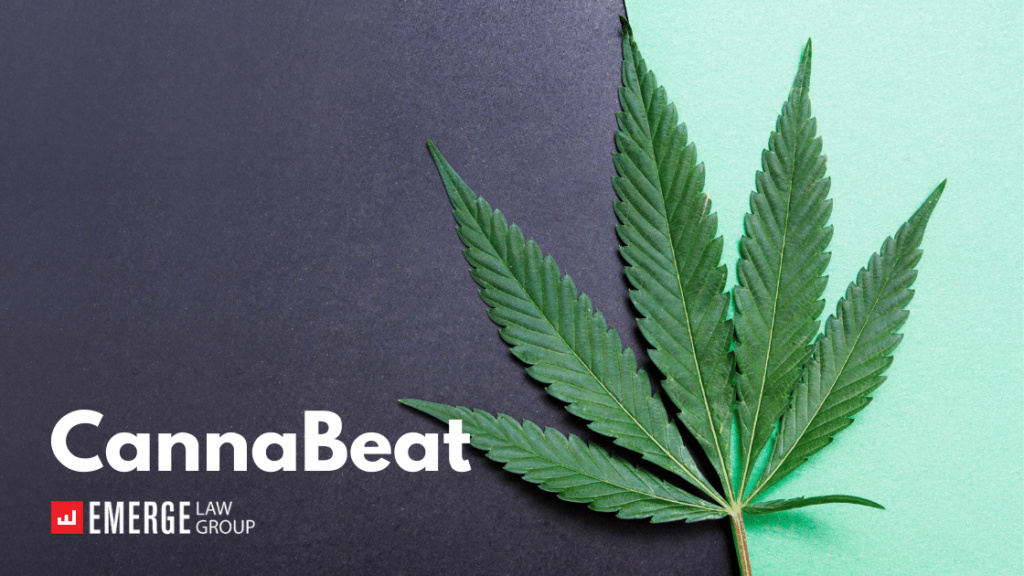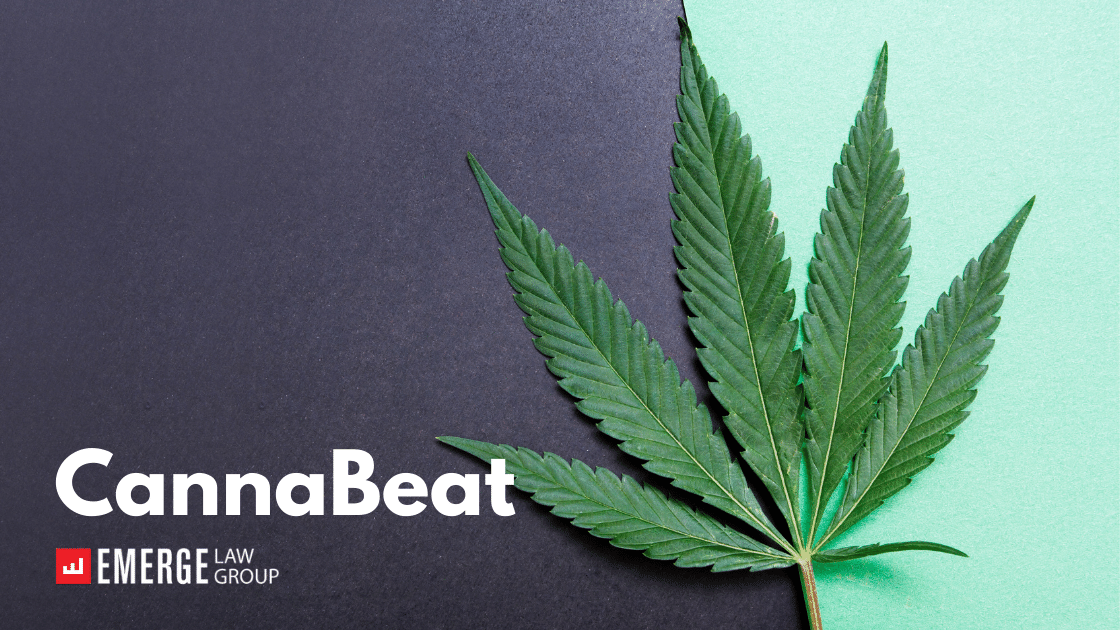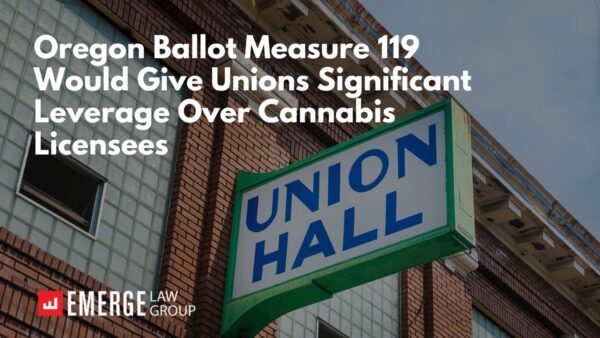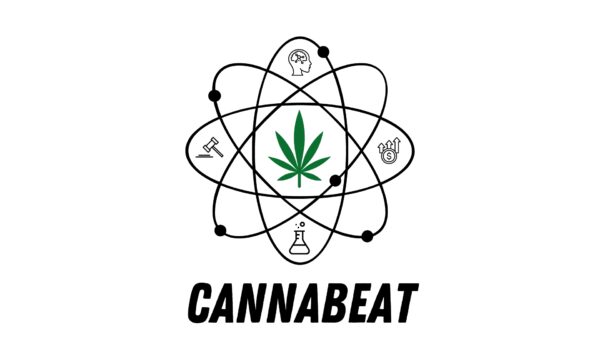CannaBeat is a curated biweekly selection of top news stories impacting business, research, and culture in the cannabis industry, crafted by Emerge Law Group.
Emerge’s Hot Take
Finding Essential Oil Dispensers to be Illegal Drug Paraphernalia, Trademark Trial and Appeal Board (“TTAB”) Affirmed Refusal of Two Federal Trademark Applications
Last month, the TTAB published a precedential opinion affirming the United States Patent and Trademark Office’s (“USPTO”) rejection of two applications for the marks “BAKKED” in standard character form and a corresponding logo. The applications sought registration for an “essential oil dispenser, sold empty, for domestic use,” and were originally filed in 2016.
Despite the absence of any reference to cannabis in the applications, the USPTO refused to register the marks due to alleged violations of the Controlled Substances Act (“CSA”). For further details, refer to the opinion in the case of In re National Concessions Group, Inc. available HERE. This decision underscores the USPTO’s and TTAB’s heightened scrutiny of applications associated with cannabis businesses.
In this case, TTAB was unconvinced by applicant’s attempts to draw parallels between its oil dispenser, and razor blades or postage scales. The TTAB found that, unlike with blades and scales, extensive evidence indicated that applicant’s identified products were primarily intended for use with schedule I drugs. Evidence included applicant’s website and marketing of its “Bakked Dabaratus” all-in-one dabbing tool, advertised for “the perfect dose of cannabis extract.”
The TTAB also rejected applicant’s claim that the application qualified for a CSA exemption, citing the legality of cannabis under state law. The USPTO has consistently maintained that a mark must be in “lawful use” under federal law to qualify for registration. In its examination, the USPTO reviewed the company’s website and social media presence, determining the primary purpose of the products was for use with cannabis.
The USPTO further clarified that, although cannabis may be legal in certain states, federal trademark registration rights extend beyond state borders, and the products would be subject to interstate commerce regulations. The authorization of one state to legalize cannabis “cannot override the laws of the other states or federal law[…]”
Emerge’s intellectual property practice group chair, Sean Clancy, had this to say: “Although this decision is precedential, it mostly reiterates the same dated policies that USPTO has been following for years in this arena, similar to the ULTRA TRIMMER case. Brand owners can only get federal registration for federally lawful goods and services. How they do that is heavily fact-dependent, and achievable with the right strategy but not easy. If National Concessions Group’s marketing had not focused on cannabis, perhaps they might have enjoyed a different outcome.” Indeed, in a footnote, TTAB noted that, “nothing in the record supports a finding that Applicant uses its marks on anything other than an apparatus used to dispense cannabis-based oils for vaping […]”
“As with everything else, cannabis businesses must exercise extra diligence and caution in developing and safeguarding their brands,” remarks trademark attorney Delia Rojas. Under the shadow of federal prohibition, brand protection remains challenging for cannabis businesses. Careful trademark strategies should be evaluated on a case-by-case basis for each business.
Other Noteworthy News
Minnesota Governor Signs Bill Legalizing Recreational Marijuana
"Minnesota Gov. Tim Walz (D) signed a bill legalizing recreational marijuana on Tuesday, making the North Star State the 23rd in the nation to fully legalize the substance. “We’ve known for too long that prohibiting the use of cannabis hasn’t worked,” Walz said in a statement. “By legalizing adult-use cannabis, we’re expanding our economy, creating jobs, and regulating the industry to keep Minnesotans safe.” The legislation allows adults 21 and older to carry up to 2 ounces of marijuana in public and possess up to 2 pounds at home, starting Aug. 1. It will also automatically expunge low-level cannabis convictions and create a board to examine expunging or resentencing felony cannabis convictions. “Legalizing adult-use cannabis and expunging or resentencing cannabis convictions will strengthen communities,” Walz added. “This is the right move for Minnesota.” However, the bill’s sponsor, state Rep. Zach Stephenson (D-Coon Rapids), has warned it will likely take time to expunge criminal records and get licensed dispensaries up and running in the state. The Minnesota Bureau of Apprehensions has previously said the earliest it would be able to expunge all records would be by August 2024."
VA Would Study Medical Marijuana Benefits for Military Veteran’s with PTSD Under New GOP-Led Bill
"A Republican congresswoman has reintroduced a bill meant to promote research into the medical potential of marijuana for military veterans. The Veterans Cannabis Analysis, Research, and Effectiveness (CARE) Act, filed last week by Rep. Mariannette Miller-Meeks (R-IA), identical to an earlier measure she sponsored last session. That bill would require the U.S. Department of Veterans Affairs (VA) to “conduct and support research relating to the efficacy and safety of forms of cannabis” for chronic pain, post-traumatic stress disorder (PTSD) and “other conditions the Secretary determines appropriate.” The legislation specifies that the VA studies must involve plants and extracts, at least three varieties of cannabis with different concentrations of THC and CBD and “varying methods of cannabis delivery, including topical application, combustible and non-combustible inhalation, and ingestion.” VA would first have to submit a research plan to House and Senate Veterans’ Affairs Committees and make any requests to support the studies. Over the course of five years after the bill is enacted, VA would need to send annual reports on its progress to the panels."
Louisiana House of Representatives Passes Cannabis Expungement Bill
"The Louisiana House of Representatives recently passed a bill to improve the state’s expungement program for cannabis possession convictions. Rep. Delisha Boyd sponsored the bill, which passed with a 69-30 vote. “House Bill 286 is a request for a reduction in expungement fees in first offense marijuana. I’ve worked closely with the DA association, sheriffs, and the clerks, to put this bill in its proper posture,” Boyd said at the hearing on May 23. The Louisiana House Democratic Caucus recently posted on social media about the bill’s passing as well. “This bill passed the House today and will make it easier for people to get the post-conviction relief and justice they need and deserve. #LaLege #LaGov.” The bill was amended by House representatives, including the adoption of the proposed law that would only apply to 14 grams or less, and also stating that the fee would be set at a maximum of $300 for those convicted of misdemeanor offenses for cannabis possession. According to the bill, these fees will be distributed immediately to the proper channels. “The clerk shall immediately direct the collected processing fees provided…to the sheriff and the district attorney, and the processing fee amount shall be remitted immediately upon receipt in equal proportions to the office of the district attorney and the sheriff’s general fund,” the bill states."
Bill Allowing Amsterdam-Style Cannabis Cafes Passes California Assembly
"A State Assembly bill that would allow Amsterdam-style cannabis cafés where customers would be permitted to consume the tranquilizing herb onsite, received broad partisan support on Wednesday, passing the assembly 64-9. While onsite cannabis consumption is allowed in certain circumstances, AB 374 would permit the sales of non-cannabis-infused products and allow for a more inviting and coffee shop-style experience. Current law bans the sale of non-cannabis related products. […] Haney sees the bill as one that will build on California's deep roots in cannabis culture and set the state on a path to better compete with Amsterdam – a city of 1.4 million people located in the Netherlands that is also known for its cannabis culture. Amsterdam currently has over 700 cafés that permit onsite cannabis use, which rake in an estimated $1 billion annually. Haney hopes the bill will help move the cannabis industry out of a "pharmacy-like business" where customers simply pick up their supplies at a dispensary and leave, into one that is more sociable. He also hopes the bill will allow the currently struggling cannabis industry a greater opportunity to diversify its businesses and to promote tourism in downtown areas and other struggling business districts across the state."
Subscribe
Subscribe to CannaBeat to receive essential weekly articles on news, business, and culture in the cannabis industry, delivered straight to your inbox.
CannaBeat by Emerge Law Group
CannaBeat is a weekly brief on news, business, and culture in the cannabis industry curated by members of Emerge Law Group's distinguished Cannabis Industry Group.






